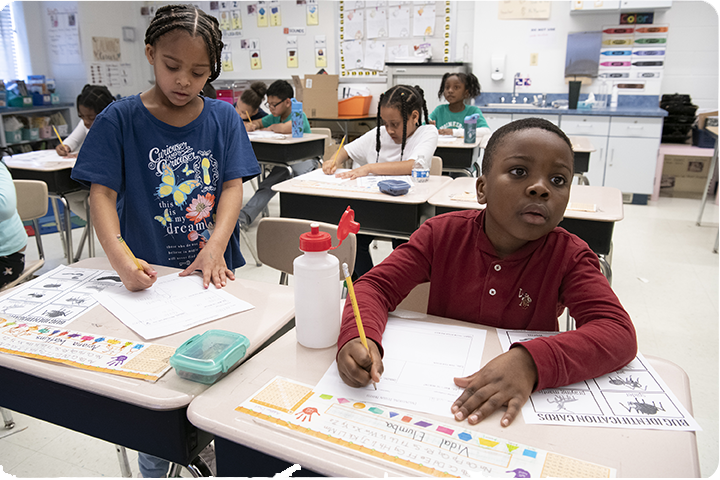Report on the Superintendent's Entry Plan
Identifying a Roadmap to Move #MCPSforward
Identifying a Roadmap to Move #MCPSforward
As part of my E3 Entry Plan—Engagement, Evaluation, and Empowerment—I began a comprehensive journey to connect with the Montgomery County Public Schools community, including our teachers, students, staff, parents, and community leaders. Our school system is large, complex, and deeply woven into the fabric of our communities and the culture of Montgomery County. It took six months to meet with as many people as possible and gain a full understanding of the needs and actions necessary to drive our school system forward. This extensive engagement process was essential for appreciating the diverse perspectives across MCPS and for identifying key themes that will guide our upcoming decisions and strategic initiatives. The following report, organized in its three phases, tells the story of what I have learned, what needs evaluation, and how we are moving forward.
My Entry Plan centered around three key phases: Engagement, Evaluation, and Empowerment. These phases are critical for aligning our actions with the needs of the community, allowing us to move the school system forward under the banner of #MCPSforward.

Phase I: Engagement
Building a Foundation for Decision-Making
The first phase involved a series of engagements with key stakeholders to learn and build trust within the community. Through numerous listening sessions—both virtual and in person, school visits, and strategic meetings with advocacy groups and elected officials—we gathered valuable insights that will shape the future direction of MCPS.

Educators, leaders, staff, and students across the school district
- Parents and caregivers
- Community and educational support organizations such as the MCCPTA, the NAACP
- Parents' Council, and the Black and Brown Coalition
- County government representatives and state legislators
- Higher education partners and advocacy groups
- Business and chamber partners
These engagements have surfaced various concerns and hopes from the community, highlighting issues that need immediate focus and strategic planning.

Feedback from in-person and virtual engagement sessions was posted on the entry plan website: entryplan.mcpsmd.org

See a document that captures the themes from all feedback submitted.
Themed Feedback Summary
from Phase I, Engagement
Question One: (OPERATIONS)
What is working well in the district and what needs attention?

Classroom Challenges & Support Needs
- Educator Struggles: Teachers, especially new ones, are overwhelmed by large classes and disruptive behavior. More professional school counselors and behavior specialists are needed.
- Special Education Gaps: Lack of support for students with significant needs is burning out teachers. They need more resources and 1:1 support.
- Lesson Pacing: Concerns over the speed of lessons for students. Educators and parents want more time for processing and smaller class settings.
- Mental Health Impact: Burnout is driving emotional strain, with some educators feeling hopeless and crying before work.

Safety & Security Concerns
- School Security: Calls for better security staff presence and infrastructure like locks, weapons detection, and controlled entry at schools. High schools especially struggle with building access.
- Special Education Safety: Staff in special programs face verbal and, in many cases, physical abuse from students, with insufficient protection in place.
- Best Practices: Many suggest MCPS adopt proven security measures from other districts for better access control.

Equity & Access Issues
- Magnet Program Preference: Families with working parents struggle to manage without sibling preference in these programs.
- School Bus Disparities: Long commutes for students in special programs drain energy and limit extracurricular participation.
- Title I Funding Gaps: Concerns over inequities in funding for Title I schools serving similar communities.

Educator & Staff Morale
- Educator Struggles: Teachers, especially new ones, are overwhelmed by large classes and disruptive behavior. More professional school counselors and behavior specialists are needed.
- Special Education Gaps: Lack of support for students with significant needs is burning out teachers. They need more resources and 1:1 support.
- Lesson Pacing: Concerns over the speed of lessons for students. Educators and parents want more time for processing and smaller class settings.
- Mental Health Impact: Burnout is driving emotional strain, with some educators feeling hopeless and crying before work.

Curriculum & Testing
- Curriculum Changes: Constant changes and extra workload, especially in Special Education, frustrate teachers. Restorative justice practices lack the staffing needed for success.
- Testing Stress: Parents and teachers worry that over-testing young children is causing undue stress.

Communication & Policy Transparency
- Improved Communication: Communication between educators and parents has improved but could be better from central services.
- Policy Clarity: More consistent district communication on policies is needed, particularly in complex situations or crises.
- MVA Closure Concerns: Frustration over the closure of the Montgomery Virtual Academy, especially for medically vulnerable children left without alternatives.

Facilities & Resources
- Building Conditions: Schools need renovations, particularly for HVAC systems and classroom door locks for safety.
- Staff Shortages: Shortages in IT, plumbing, and counseling are causing operational inefficiencies and hurting the learning environment.

Positive Feedback
- Educator Dedication: Staff and departments, like Evaluation and Selection of Materials, are praised for their dedication and improved communication.
- Special Programs: Satisfaction with programs like Form 560-80 for student accommodations and the strong music offerings in schools.
Question Two: (ACADEMICS)
What should be done differently to improve student academic results?

Gifted and Advanced Learners:
Parents say resources are overly focused on lower-performing students, leaving advanced learners behind. They want expanded programs like the Center for Enriched Studies (CES) and more math enrichment to balance current literacy initiatives.

Curriculum and Pedagogy:
Frequent curriculum changes disrupt learning. Programs like Eureka Math are seen as overly complicated, with calls to return to traditional teaching methods and give teachers more flexibility.

Equitable Access:
Even affluent parents struggle to secure early interventions for children, especially those with learning disabilities. The most vulnerable—Emergent Multilingual Learners (EML)—are often left without timely support due to delays in screenings and interventions.

Accountability:
Parents and teachers want more staff accountability and less disruptive behavior. Stricter phone policies are also suggested to reduce distractions.

Early Intervention:
Parents push for more early intervention, especially in K-2, where it has the greatest impact. They suggest more school psychologists, dyslexia specialists, and partnerships with dyslexia education centers.

Mental Health:
Social and emotional learning (SEL) is viewed as critical to academic success, with recommendations for more outdoor learning, community engagement, and hands-on activities that connect lessons to real life.

Class Size:
Smaller class sizes are seen as key to boosting both academic and emotional development, especially in early grades.

Equitable Resources:
Calls for consistent access to special education and intervention programs across schools to ensure all students get the support they need.

Testing:
Many feel there's too much focus on testing, especially for younger students, and advocate for less frequent tests and more hands-on learning.

Grading Policy:
The current grading policy, introduced during remote learning, is criticized for not accurately reflecting student mastery and fostering counterproductive behavior.

Educator Support:
Educators ask for autonomy with planning time, smaller classes, and freedom to adapt lessons to student needs.
Groups & Individuals Met Across
Montgomery County, Maryland
Community Engagement Sessions
- Educator "UnConference", Virtual, Sept. 10
- Community Engagement Session / Poolesville HS, Sept. 16
- Community Engagement Session / Rockville HS, Sept. 18
- Community Engagement Session / Montgomery Blair HS, Sept. 23
- Community Engagement Session / Paint Branch HS, Oct. 21
- Community Engagement Session / Black & Brown Coalition Town Hall, Wheaton HS, Oct. 23
- Operating Budget Engagement Session / James Hubert Blake HS, Nov. 11
- Community Engagement Session / Walt Whitman HS, Nov. 14
- Operating Budget Engagement Session / (Spanish) Facebook Live, Nov. 18
- Operating Budget Engagement Session / Clarksburg HS, Nov. 21
Montgomery County Public Schools (MCPS) Employees and Employee Associations
- School-based administrators and principals at schools
- Educators and paraeducators across all grade levels
- Support staff (bus drivers, cafeteria workers, custodial staff, etc.)
- Special education teachers and service providers
- Athletics staff
- Montgomery County Education Association (MCEA)
- Service Employees International Union (SEIU Local 500)
- Montgomery County Association of Administrators and Principals (MCAAP/MCBOA)
- MCPS Retirees Association
- League of Educators for Asian American Progress (LEAAP)
Elected Officials and Government Agencies
- Montgomery County Board of Education members
- Montgomery County Council members
- Office of the County Executive
- Maryland State Delegation (representatives from Montgomery County)
- Montgomery County Planning Board
- Montgomery County Office of the Inspector General
- Montgomery County Police Department (MCPD)
Student Groups
- Student Member of the Board of Education (SMOB)
- Montgomery County Regional Student Government Association (MCR-SGA)
- Minority Scholars Program (MSP) representatives
- Student Journalists

Community and Parent Organizations (including Advocacy and Civic Groups)
(These meetings are ongoing and expanding)
- Montgomery County Council of Parent-Teacher Associations (MCCPTA)
- NAACP – Montgomery County Education Committee/Parents Council
- Identity, Inc. (serving Latinx families)
- Black and Brown Coalition
- Black Coalition for Excellence in Education
- Council on American-Islamic Relations (CAIR) - Maryland Chapter
- CASA (immigrant rights group)
- League of Women Voters of Montgomery County
- Montgomery County Faith Community Advisory Council
- Jewish Community Relations Council of Greater Washington
- Montgomery County Taxpayers' League
- Nonprofit Montgomery
- School-based Food Assistance Agencies
- The Upcounty Hub
Education Organizations
- Montgomery College leadership
- Public School Superintendents' Association of Maryland (PSSAM)
- Maryland State Department of Education (MSDE)
- Washington Area School Superintendents Consortium
MCPS Schools Visited (Ongoing)
73 MCPS Schools:
- 41 Elementary Schools
- 16 Middle Schools
- 15 High Schools
- 1 Outdoor Education
- 3 Special Education
- 1 Early Childhood
Phase II: Evaluation
A Reflection on Strengths and Challenges
Equity of Access to Programs:
The review of equity of access focused on whether all students, regardless of background, have fair opportunities to participate in specialized academic, extracurricular, and support programs.
Policy Concerning Grading:
The district's grading policy must be reexamined to ensure fairness, consistency, and alignment with educational standards, as well as to ensure that student performance is accurately reflected and promotes academic success.
Policy Concerning Absenteeism:
The district must address absenteeism policies to better support student attendance, ensuring our strategies to reduce chronic absenteeism and keep students engaged in learning is enough and what more can be done.
Policy to Guide Artificial Intelligence (AI):
It is clear we must consider the district's approach to the impact of AI technologies in a way that could enhance learning while maintaining ethical standards and protecting student data.
Fiscal Stewardship:
The assessment of fiscal stewardship examined how well the district manages its financial resources, ensuring they are allocated responsibly and efficiently to meet educational goals.
Operating Budget Investments:
This area assesses how investments in the operating budget align with strategic priorities, ensuring that funding supports key initiatives, instructional quality, and overall student success.
Capital Improvements Plan (including facility maintenance and schedule of projects):
Although an off-year for the Capital Improvements Plan, the district must ensure that the long-term strategy for facility upgrades, maintenance, and project timelines are appropriate, in line with county growth, and promote environments conducive to learning.
Internal Controls:
A thorough evaluation of the system's internal controls in financial processes and operational procedures was conducted to ensure reliability, transparency, and safeguards against fraud or mismanagement.
Key areas of evaluation that must drive operating budget priorities include:
Safety & Security:
Prioritizing the physical and emotional well-being of students and staff. The community voiced concerns about school safety, emphasizing the need for a comprehensive strategy to prevent and address security threats.
Emergent Multilingual Learners:
Strengthening supports for students whose primary language is not English. As MCPS sees a growing number of emergent multilingual learners, there is a critical need to provide resources and instructional strategies to help these students succeed academically.
Special Education:
Ensuring students with special needs receive the individualized support they require. Families of students with disabilities highlighted the complexities of navigating the special education system, signaling a need for more significant support and transparency in services.
Math & Literacy Instruction:
Enhancing the quality of instruction in these foundational subjects. The community has called for improved instructional practices, targeted interventions, and professional development for teachers to ensure all students are proficient in these essential areas.
Class Size and its Impacts:
The relationship between class size and instructional quality. Community members expressed frustration with overcrowded classrooms, emphasizing the need for equitable student-teacher ratios to foster effective learning environments, greater post secondary outcomes and student well being.
Phase III: Empowerment
A Bold and Unapologetic Path to Move #MCPSforward
The path forward is clear, and it's my responsibility to lead MCPS in fully empowering our community—students, staff, and families—to take an active, intentional role in shaping a school system where equity, excellence, and opportunity are non-negotiable. A focus on the fundamentals in teaching and learning must also be central to our approach, ensuring every student builds a strong foundation in essential skills and knowledge. The time for passive participation is behind us. My role is to cultivate a culture of shared responsibility and support, where every voice is heard, every action is intentional, and every outcome moves us closer to a more inclusive, just, and high-performing MCPS. I am committed to creating an environment that enables every student to thrive. This is my mandate, and I will pursue it without hesitation or compromise.
Key empowerment initiatives will focus on:

Transparency and Communication:
Establishing clear, frequent, and accessible communications to ensure all stakeholders have access to information about decisions and progress within MCPS.

Cultural Competence and Antiracism:
Ensuring that MCPS is a safe, welcoming, and inclusive space for all students, regardless of their background.

Service to Schools:
Adopting a service to schools mindset, providing better support to principals, educators, and school-based staff to enhance the daily experiences of our students. An example of "service to schools" is the school ambassador program in which central services personnel worked in schools during the first two weeks of school. The first couple of weeks of the school year are busy times needing extra focus to ensure a smooth start to teaching and learning.

Addressing Bureaucracy and Community Frustrations:
One recurring theme across all engagements has been the frustration with bureaucracy that is perceived to hinder progress and responsiveness. As a result, there will be a concentrated effort to streamline processes, reduce administrative barriers, and improve customer service for families, staff, and the broader community. This will make MCPS more efficient and more responsive to the immediate needs of students and families.
How it Gets Done

A New Strategic Plan for MCPS
Through a comprehensive and inclusive strategic plan, we will align district actions with clear, measurable goals, prioritizing student achievement and operational excellence.

Return on Investments
Key investments in our operating budget must ensure that resources are directed toward schools, students and educators. We must increase targeted academic support, innovative professional development and expanded family engagement.

Responsible Reorganization
MCPS will organize its people, systems, processes, and resources to foster an environment where every student can excel. Empowerment also means that staff and leadership teams are organized into structures that can effectively implement our plans and investments.
Guiding Principles

All decisions must be made in the best interest of students.

All great decisions begin with listening, empathy, relationships and research.

All children in our community deserve access to remarkable learning experiences characterized by equity, engagement and support—Every Student, Every Day!

All members of our community are valuable; community voices should be heard.

All actions must be the model of collaboration and transparency.

All things begin and end with the culture that leadership creates.

#MCPSforward
Empowerment is also about building the capacity of students to take ownership of their learning, of staff to lead with confidence and expertise, and of families to actively engage as partners in the educational process. This collective approach to moving MCPS forward will mean that every individual in MCPS has the opportunity to grow, succeed, and contribute to the success of our school system.
What I Have Learned in Six Months
A Collective Journey Forward
Throughout this journey, I have listened deeply to the voices of our community, reflecting on both our strengths and the challenges that lie ahead. As we move forward, we will adopt a "focus on fundamentals" approach in teaching and learning, reinforcing foundational skills that are essential to student success. Together, we must commit to the intentional, focused work that will shape MCPS into a more inclusive, safer, and higher-performing school system. The key themes I've identified are not just priorities—they are our collective roadmap to progress, guiding our efforts and investments with a clear purpose. We will continue moving #MCPSforward, together, boldly and unapologetically. This is not only your expectation—it is my promise, and it will be the measure of our success.
Thomas W. Taylor, Ed.D., M.B.A.
Superintendent
Montgomery County Public Schools

